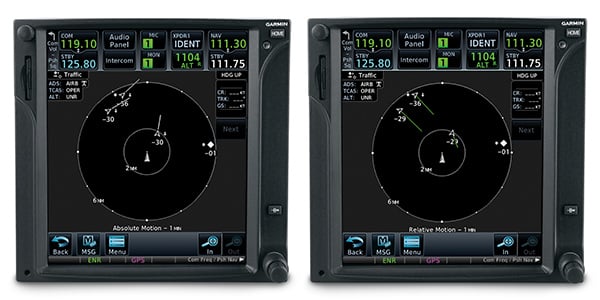Garmin GDL 88
Get Tomorrow’s Technology Today
- Dual-link Universal Access Transceiver (UAT)
- ADS-B “Out” solution for many aircraft
- FIS-B subscription-free weather
- ADS-B traffic receiver
- Optional SBAS/WAAS GPS receiver
The GDL® 88 is the first dual-link solution for certified aircraft, including many popular makes and models of helicopters, that not only provides a path to ADS-B “Out” compliance for many pilots, but also brings subscription-free weather and advanced traffic display to the cockpit.
Satisfy the ADS-B Requirements
Under the NextGen air traffic management system, all aircraft in controlled airspace will need to be equipped with Automatic Dependent Surveillance – Broadcast (ADS-B) “Out” technology before the end of 2019. For those who only fly below Class A airspace (18,000 feet) and in U.S. skies, the GDL 88 offers an affordable solution to reaching compliance. And even if you fly above 18,000 feet, the GDL 88 can still give you all the benefits of ADS-B “In” data – consider pairing it with a GTX 330/33 ES transponder for a comprehensive ADS-B “In/Out” solution. With ADS-B “Out”, the GDL 88 gathers information about your position, track and ground speed from either your existing WAAS GPS source or an optional built-in WAAS receiver. It then broadcasts this information to ADS-B ground stations over the 978 MHz Universal Access Transceiver (UAT) frequencies. This gives ATC and ADS-B “In” equipped aircraft a more precise picture of what’s happening in the sky, and allows for more safe and efficient flight routing.
Access Aviation Weather
The GDL 88 also features ADS-B “In” datalink technology that allows it to receive subscription-free Flight Information Service-Broadcast (FIS-B) weather broadcast from ADS-B ground stations on this same 978 UAT frequency. On a compatible flight display, this uplink allows you to view graphical NEXRAD radar, METARs, TAFs, SIGMETs, AIRMETs, NOTAMs, TFRs and more.
Spot Potential Traffic Threats
The GDL 88 can receive ADS-B position reports directly from other aircraft in your vicinity. Because the FAA permits ADS-B broadcasts on 2 frequencies (978 UAT and 1090 ES), the GDL 88 contains both receivers so you can see a comprehensive view of all ADS-B “Out” equipped targets. ADS-B provides the ability to provide air-to-air datalinks with other aircraft. The GDL 88 is compatible with active traffic systems and prioritizes multiple traffic inputs, removing duplicate targets by choosing the highest integrity source available.
ADS-B “In” technology also allows the GDL 88 to receive Traffic Information Service-Broadcast (TIS-B) information. On a compatible display, TIS-B allows you to view the same dynamic traffic picture that ATC ground controllers are seeing.
Take Advantage of Advanced Display Capabilities
 TargetTrend™ technology (available on compatible displays) provides an easy-to-interpret picture of aircraft trajectories. When receiving ADS-B traffic information, this allows you to better predict potential conflicts. TerminalTraffic™ provides pilots with the most comprehensive picture of ADS-B-equipped aircraft and ground vehicles in the airport environment. ADS-B-equipped aircraft in-flight are easily distinguished from ground vehicles and taxiing aircraft, which are displayed using distinct colours and symbols. All of this information is presented to the pilot on a simple, easy to understand SafeTaxi® diagram with reference to runways, taxiways hangar locations and more. Additionally, when configured for helicopter operations, TerminalTraffic helps pilots easily distinguish potential traffic conflicts while in the airport environment by minimizing nuisance alerts from fixed-wing aircraft and abbreviating select alerts while performing unique helicopter maneuvers such as hovering.
TargetTrend™ technology (available on compatible displays) provides an easy-to-interpret picture of aircraft trajectories. When receiving ADS-B traffic information, this allows you to better predict potential conflicts. TerminalTraffic™ provides pilots with the most comprehensive picture of ADS-B-equipped aircraft and ground vehicles in the airport environment. ADS-B-equipped aircraft in-flight are easily distinguished from ground vehicles and taxiing aircraft, which are displayed using distinct colours and symbols. All of this information is presented to the pilot on a simple, easy to understand SafeTaxi® diagram with reference to runways, taxiways hangar locations and more. Additionally, when configured for helicopter operations, TerminalTraffic helps pilots easily distinguish potential traffic conflicts while in the airport environment by minimizing nuisance alerts from fixed-wing aircraft and abbreviating select alerts while performing unique helicopter maneuvers such as hovering.
The advanced capabilities of the GTN series avionics and G500/600 flight displays allows for enhanced functionality with the GDL 88. When there are several traffic targets in an area, these devices will declutter the display by grouping the targets and showing only the one that is the highest priority. The pilot can touch a grouped target to ungroup and show all targets in the area. The GTN and G500/600 also allows the pilot to select any target on the display to view more detailed information including closure rate and ground speed.
Specifically designed for helicopters, when paired with GTN series touchscreen navigators, On Scene mode reduces nuisance alerts when you’re intentionally operating in close proximity to other helicopters, such as during electronic news gathering, alerting you only when new threats are present.








